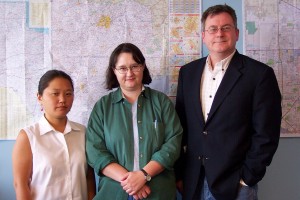News Innovators on the Frontline: Texas Watchdog
Posted on 17. Jul, 2009 by Damian Ghigliotty in Audio, New News Organization, News Ecosystem, Not-For-Profit
 Two and half years ago, Trent Seibert, of Texas Watchdog, saw the potential for a local online investigative news outlet. Having worked in both journalism — at The Tennessean and The Denver Post — as well government accountability — at the Tennessee Center for Policy Research — Trent had all the right credentials.
Two and half years ago, Trent Seibert, of Texas Watchdog, saw the potential for a local online investigative news outlet. Having worked in both journalism — at The Tennessean and The Denver Post — as well government accountability — at the Tennessee Center for Policy Research — Trent had all the right credentials.
Fortunately, a chance meeting with some like-minded funders at a journalism conference in 2006 brought him enough start-up money to launch Texas Watchdog, a nonprofit news site in Houston covering local and state government corruption and waste. The Watchdog’s first story went online in August 2008. Since then the three-member team has divided up the work needed to run an investigative news outlet. All three tackle the editorial work: reporting, editing and assigning stories to freelancers. In addition, Trent handles their public affairs and “carnival barking,” while his colleagues, Jennifer Peebles and Lee Ann O’Neal, manage the site’s databases and bookkeeping.
Texas Watchdog recently joined 25 other nonprofit news organizations at the Pocantico Estate in New York to lay the foundation for an investigative news network.
How did Texas Watchdog get started?
When the Sam Adams Alliance gave us our start-up money, part of the deal was that if we were to make this work, we would have to be in a place with a big enough market for this kind of journalism, a place where we can sustain the work we do. There are only a few places in the U.S. to do that, and I hate to say that because I was living in Nashville, Tennessee, at the time and I love Nashville. But you need to be in a state with a big media market, and that means California, New York, or Texas. These are the places where America’s ideas come from, for good or for bad. So, we ended up picking Houston, Texas, as a place to launch this idea.
In part we thought it was a great market down here, because it’s a big city that wasn’t drenched in media. There was room for us. And Houston has more than it’s share of billionaires, so we thought we might be able to knock on a door and make a 501(c)(3) work.
How do you keep new revenue coming in?
We’re real new, and this whole concept is real new. We don’t have a big benefactor yet. So, a big chunk of our revenue comes from running educational programs that teach people about journalism. Half of our time is doing investigative and enterprise journalism here in Texas. The other half is us, at different times, going around the country and getting revenue by teaching individual groups — whether civic groups, public policy groups or blogging groups — how to do, for lack of a better term, journalism. We teach them how to file a public records request. We teach them how to look at their city halls and their schools.
With the decline of newspapers, they’re getting less information than ever before, so we’re able to give them the tools to find that information themselves. We’ve been able to cobble together a budget, between our initial grant money and creating revenue this way, to get us to the end of the year.
What do your freelancers get out of that?
Well, I can’t tell you exactly how much we pay them. But I will say that we pay our freelancers very well. I know how it feels to be in that boat. I worked at a newspaper once that paid something like 50 bucks for a freelance front-page story. It made me want to walk into the publisher’s office and beat her like a baby seal. It was embarrassing. Good writing deserves good money. Although, keep in mind, our medical benefits amount to a couple of Band Aids and some Aspirin. We’re not in a good position there yet, but hopefully we’ll be there in the next few years.
Sounds good, maybe I’ll swing by Houston in the near future. Do you see any opportunities to expand in other ways?
If you look at New York City as an example, The Village Voice used to be the one waving its fists in the face of City Hall and at the same time doing great media and music coverage. Alternative weeklies have all gone down hill since those days. So, I wouldn’t mind expanding to other areas of coverage some day. But that’s really down the road. Right now our bread and butter is doing the investigative journalism that major metros just don’t have the time and budget to cover anymore. And the local-er, the better for me. If I could find corruption on the sewer commission, brother, I would work on that all day.
What about working in conjunction with other local news outlets?
We get picked up by other news outlets fairly often. But it’s weird. We’re here to help supplement what’s missing in journalism in Houston, but at the end of the day we’re a competitor. We’ve been all over this great story about the Houston airport, with these bizarre companies operating in secret, and nobody’s picked up on it yet. But that doesn’t shock me, because we did the same thing when I was in Denver. When I was working with The Denver Post, our competitor was the Rocky Mountain News, and when they broke something really good that we didn’t have, we tried to make every excuse in the world to convince our editors, “aw, that’s not a real story. We knew that all along.”
Click below to hear an audio clip from our interview with Trent Seibert.
[audio:http://cdn.journalism.cuny.edu/blogs.dir/10/files/2009/07/Trent-Seibert-Audio-Clip.mp3]2 Responses to “News Innovators on the Frontline: Texas Watchdog”
Trackbacks/Pingbacks
-
-
December 8, 2009
[…] training a possible new revenue stream for news organizations? One Texas news organization thinks so. Will these citizen-driven sites ever be appealing to advertisers? And does that even matter if […]




dru fuller
17. Jul, 2009
Interesting article — especially the part about providing educational sessions to improve the bottom line.